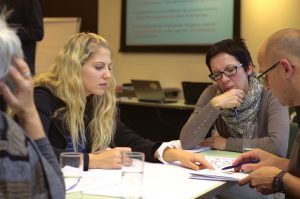Using role play to explore professional situations for practice-based courses
Sue Pinnick
What is the idea?
This chapter explores how practice-based courses in a professional environment, such as teaching, social work or medicine, can use role play to help students explore ideas of professionalism in different scenarios to prepare them for work-based settings.
Students will work collaboratively in groups, using exploratory dialogic talk in order to reach a consensus on a scenario that they will create from a range of situations. They will then produce two role plays where they reenact the scenario: the first representing unprofessional behaviour; the second representing professional behaviour. The rest of the groups will have the opportunity to reflect on and ask questions of the scenario. All groups will reflect on the strengths and challenges of the activity itself.
Why this idea?
Evans (2008) suggests that there are two types of teacher professionalism: the professionalism ‘prescribed’ by policies and national standards and the ‘enacted’ professionalism existing in teachers’ practices, predominantly at a school level. Both school mentors and trainee teachers on initial teacher education (ITE) programmes have recognised that learning to be ‘professional’ can be a challenge for some trainee teachers (Pinnick, 2020). However, not only do trainee teachers need to provide evidence of ‘prescribed’ professionalism in order to meet the teacher standards (DfE, 2012), but, perhaps more importantly, they need to enact professionalism on a daily basis, in order to form relationships with both staff and students and adapt to the school community or ‘habitus’ (Bourdieu, 1990). In preparation for their induction into trainees’ initial teaching placement, it is important to cover some of the challenges they may face in the first few weeks.
While, of course, it is always possible to explore professional dilemmas theoretically, since Dewey (1938), educators have identified the fundamental role of experiential, embodied learning in learning. In their U.S based meta-analysis of the effects of drama-based pedagogy on outcomes across the curriculum, Lee et al. (2015) highlighted the impact of drama as an embodied approach to learning. More recently, pioneering neuroscientific research suggests that when our bodies interact through drama, not only do we transport new experiences to the brain, but we deeply encode the information and transform it into knowledge (Damasio, 2021; Gallese & Wojciehowski, 2011; Immordino-Yang & Gotlieb, 2017). Moreover, this activity includes the opportunity for students to use exploratory dialogic talk in order to reach a consensus. Interaction through talk ‘vitally mediates the cognitive and cultural spaces between …learner[s] ‘of any age…and what he or she has yet to know and understand’ (Alexander, 2020, p. 15).
How could others implement this idea?
Put students into groups of approximately four, with a mix of gender, age and background if possible. Ideally, at this stage, they will know each other and be comfortable working in groups.
Give each group two different situations to discuss from the following options:
- In the classroom
- Around the school
- In meetings
- Observing a lesson
- Issues with other colleagues
- Social media
- After school social events with colleagues
- Personal social events where you may encounter pupils or colleagues
Give each group two sheets of A3 paper. Give them 30 seconds to bullet point examples of different scenarios that they may come across in their two different situations.
Groups then go and look at what other groups have come up with before revising their own list, e.g. In the classroom: using a mobile phone while teaching.
Groups decide on a final scenario to role play – they must show two versions: one demonstrating how they would behave unprofessionally; one with the professional version (two to three minutes maximum per role play).
After each role play, ask others to ask questions and reflect on potential issues and solutions.
End with a final reflection asking the following questions: what did they learn individually through participating in the role play? What did they learn from watching the others? What did they learn about professionality in schools? What were the benefits and challenges of the activity itself?
Transferability to different contexts
The idea is relevant to all ITE educators but could also be adapted for any course where students participate in a professional practice work placement such as social work, medicine, business or management; engineering or creative industries. To adapt the activity, the lecturer just needs to alter the different situations to make them appropriate for their context.
Links to tools and resources
- How to teach using role-playing – Carleton College
- Simulation and Role-play in Edwards School of Business – University of Saskatchewan
- Teaching Approaches Menu – Sheffield Hallam University
References
Alexander, R. (2020). A dialogic teaching companion. Routledge.
Bourdieu, P. (1990). The logic of practice. Stanford University Press.
Damasio, A. (2021). Feeling & knowing: Making minds conscious. Cognitive Neuroscience, 12(2), 65-66. https://doi.org/10.1080/17588928.2020.1846027
Dewey, J. (1938). Experience and Education. Macmillan.
Department for Education. (2012). Teachers’ standards. https://www.gov.uk/government/publications/teachers-standards
Evans, L. (2008). Professionalism, professionality and the development of education professionals. British Journal of Educational Studies, 56(1), 20-38. https://doi.org/10.1111/j.1467-8527.2007.00392.x
Gallese, V., & Wojciehowski H. (2011). How stories make us feel: Toward an embodied narratology. Journal of California Italian Studies 2(1), 1-35. https://doi.org/10.5070/C321008974
Immordino-Yang, M.H., & Gotlieb, R. (2017). Embodied brains, social minds, cultural meaning: Integrating neuroscientific and educational research on social-affective development. American Educational Research Journal, 54 , 344-367. https://doi.org/10.3102/0002831216669780
Lee, B. K., Patall, E. A., Cawthorn, S. W., & Steingut, R. R. (2015) The effect of drama-based pedagogy on preK–16 outcomes: A meta-analysis of research From 1985 to 2012, Review of Educational Research, 85(1), 3–49. https://doi.org/10.3102%2F0034654314540477
Pinnick, S. (2020). Mentoring secondary English trainee teachers: a case study. English in Education, 54(3), 251-264. https://doi.org/10.1080/04250494.2020.1777097



